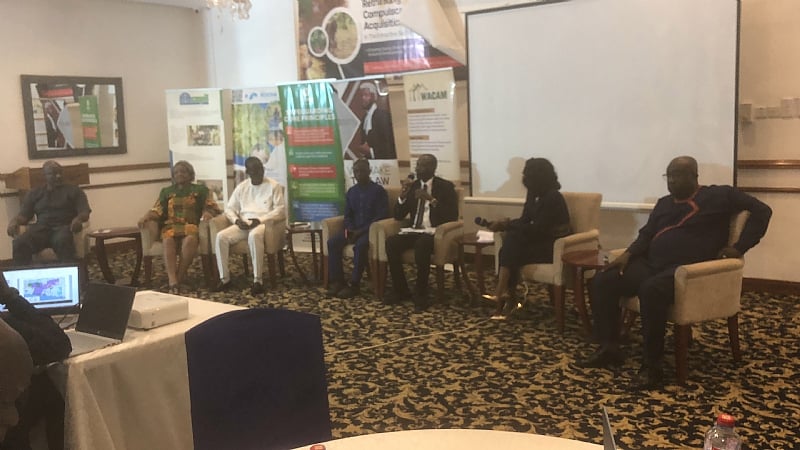The clash between mining interests and community land rights continues unabated in Ghana, particularly in the Ahafo Ano North District of the Ashanti Region. Residents allege intimidation, arrests, and forceful land acquisition by mining companies, exacerbating tensions and raising questions about the government’s adherence to its own laws and international standards. While Article 20 of Ghana’s mining laws permits compulsory land acquisition for national development, it mandates fair and adequate compensation and the right to legal redress for affected individuals. However, community members claim these provisions are routinely ignored, leaving them vulnerable to exploitation and dispossession. This conflict highlights a critical issue: the balance between economic development through resource extraction and the protection of community rights and livelihoods.
The heart of the dispute lies in the process, or lack thereof, by which land is acquired. Community testimonies reveal a pattern of exclusion and lack of transparency. Landowners like Mr. Joseph Adu report being sidelined from negotiations, with agreements reached between chiefs and company representatives without their knowledge or consent. This lack of consultation often leads to the shocking discovery of land confiscation only after properties are destroyed, highlighting a disregard for community ownership and established procedures. The subsequent intimidation, legal battles, and arrests faced by those who protest further erode trust and create a climate of fear. This pattern underscores the urgent need for a more inclusive and participatory approach to land acquisition, ensuring that affected communities have a voice in decisions that impact their lives and livelihoods.
The Lands Commission, responsible for managing land acquisitions, defends its actions by citing agreements signed by chiefs and elders. However, this defense ignores the crucial point that individual landowners, the most directly affected parties, are often excluded from these agreements. This reliance on traditional authorities without direct engagement with landowners raises concerns about power imbalances and the potential for marginalization within communities. Mr. Adu’s criticism of the commission’s approach echoes a broader concern: the inadequate representation of individual landholders in the decision-making process. This raises fundamental questions about who truly benefits from land acquisitions and whether the current system adequately safeguards the rights of those most vulnerable.
The Lands Commission, while acknowledging the challenges, points to a deeper systemic issue: the frequent bypassing of established procedures by the central government. Mr. Jonathan Lari, Head of Legal Affairs at the commission, reveals that the government often makes land acquisition decisions with mining companies before consulting the commission, placing them in a reactive rather than proactive role. This preemptive action by the government often results in mining companies occupying land before formal acquisition procedures are completed, creating a fait accompli that undermines legal processes and further disenfranchises communities. This dynamic highlights a critical disconnect between government policy and its implementation, raising questions about accountability and transparency in the land acquisition process.
Stakeholders advocating for community rights emphasize the importance of Free, Prior, and Informed Consent (FPIC) as a fundamental principle in land acquisitions. FPIC, as defined by the United Nations, requires genuine consultation, free from coercion or manipulation, ensuring that communities have access to all relevant information and can make informed decisions about their land. Although Ghana has adopted the principles of FPIC, particularly as mandated by the ECOWAS Mining Directive, its implementation remains problematic. The frequent bypassing of the Minerals Commission’s procedures, which incorporate FPIC guidelines, underscores the disconnect between policy and practice. This failure to implement FPIC effectively undermines the rights of communities and perpetuates the cycle of conflict over land acquisition for mining.
The situation in the Ahafo region exemplifies the consequences of neglecting FPIC. Mrs. Hannah Owusu-Koranteng of WACAM describes a pattern of state coercion, intimidation, and manipulation to acquire land at minimal cost, disregarding community rights and legal processes. The destruction of property without consent or compensation, followed by legal action against protesting community members, paints a disturbing picture of power imbalances and the vulnerability of local communities. This not only creates immediate hardship for those affected but also sets a dangerous precedent, normalizing the disregard for community land rights and potentially emboldening further exploitation. This scenario underscores the urgent need for government action to protect its citizens’ rights and ensure that land acquisition processes are fair, transparent, and respectful of community interests. Ignoring these issues risks further escalating tensions and undermining the very foundations of sustainable development. Ultimately, a more equitable and inclusive approach to land acquisition is essential not only for protecting community rights but also for fostering a more stable and prosperous future for all stakeholders.


